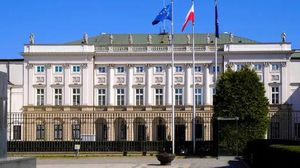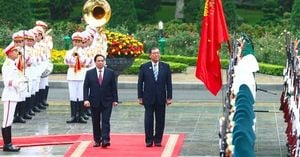The Swiss government's immigration policies are undergoing significant changes as the number of asylum applications continues to decline dramatically. According to recent analyses from the State Secretariat for Migration (SEM), the country is expecting only between 21,000 and 27,000 asylum applications by the end of the year, marking nearly a 15% drop from the previous year.
Statistics indicate 27,740 asylum applications were submitted last year, down around 8% from the 30,223 recorded in 2023. This noticeable decrease has been largely attributed to reduced numbers of migrants from Turkey, Afghanistan, and Syria seeking refuge in Western Europe, coupled with fewer landings on the southern Italian shores. The SEM projects various scenarios for the future, with the most likely outcomes predicting reductions, which also cite the geopolitical shifts impacting asylum migration.
Reminiscing over the last two years, there has been close scrutiny over the changing patterns of asylum applications. SEM reports depict how even within the last twelve months, the number of rejected applications surged by 18.5%. This points to stricter regulations and heightened vetting procedures following increased numbers of asylum seekers previously.
To adapt to the declining number of asylum seekers, the SEM has bolstered its workforce. Since 2022, it has added around 300 full-time positions to expedite the processing of these asylum applications, aiming for every new application to be processed by 2026. This enhancement of human resources is part of a broader strategy to manage Switzerland's immigration challenges more effectively.
One notable strategy involves focusing on domestic labor needs rather than relying on foreign applicants to fill gaps. The Federal Council of Switzerland has publicly expressed intentions to accelerate integration processes for foreign workers already residing within the country, particularly aiming to assist women from immigrant backgrounds. This initiative reflects the government's push to harmoniously blend its labor market with existing foreign populations, promoting both economic stability and community cohesion.
While these policy shifts aim to mitigate the challenges posed by immigration, they have been met with mixed public sentiment. The Swiss People's Party (SVP), known for advocating stricter immigration controls, is poised to significantly influence future immigration policy discussions, raising concerns among pro-immigration advocates about potential limitations and barriers faced by asylum seekers.
Despite government optimism about reducing pending asylum claims, the recent figures still paint a challenging picture. From about 16,000 pending applications, SEM has managed to decrease this number to around 12,000. The expected scenarios anticipate continuing down this path as inflow numbers diminish worldwide. Such dynamics compel the Swiss government to navigate carefully through public opinion and policy effectiveness.
Looking forward, the SEM is working under the premise of reduced asylum applications over the coming years, with potential consequences for both the economy and sociocultural fabric of the nation. One of the anticipated impacts includes potential shifts in public funding directed toward integration programs and resources spent on processing asylum cases.
Compounding these developments are the broader economic discussions surrounding the impact of foreign workforce integration on local employment. The tension between labor market needs and immigration control measures is likely to be at the forefront of policy debates as 2025 approaches.
The long-term effects of these policies and application trends remain to be seen. Overall, Switzerland's resolve to adapt to changing immigration landscapes will have significant ramifications not only for asylum seekers but for the country's economic standing and cultural diversity.



